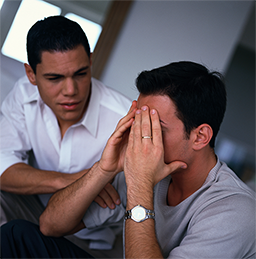 Do you sometimes think that if you change how you look or act, if you find the right tone of voice or say just the right words, if you work hard not to aggravate your partner, then things will be different?
Do you sometimes think that if you change how you look or act, if you find the right tone of voice or say just the right words, if you work hard not to aggravate your partner, then things will be different?
Do you ever think that if you become more lovable, your partner will be more loving—and the abuse will stop?
If this thinking sounds familiar, you’re certainly not alone.
Here are some other things to think about:
- Abuse isn’t your fault. It’s the abuser’s choice. And it can be a crime.
- Walking on eggshells trying to please your partner will not stop the abuse. In fact, studies show that with time, the abuse will most likely become more frequent and more violent.
- Drugs and alcohol do not cause abuse. If your partner drinks or takes drugs, they may need treatment for those problems, but that treatment will not change the abusive behavior.
- If your partner really wants to change, they should participate in a qualified violence intervention program where they can learn about violence and practice skills that will help them understand and stop abusive behavior.
- Separating from your partner won’t guarantee the abuse will stop. It may continue in new and unpredictable ways.
- You deserve to be treated with love and respect—and to take care of yourself. A good first step is to talk with someone who cares and understands. Call our helpline at 1.800.863.9909 or one of the domestic abuse programs in your area.
Domestic abuse affects anyone regardless of someone’s actual or perceived race, color, religion, national origin, sex, gender identity, sexual orientation, ability, or age.
Domestic violence or abuse
It isn’t an occasional fight or even just a nasty argument.
It is a pattern of physical, verbal, or sexual threats or aggression used by one person in a relationship to control the other.
Abuse can range from emotional torment like name-calling and isolation, to harassment like stalking and intimidation, to violence and physical harm.
It affects every community: regardless of someone’s actual or perceived race, color, religion, national origin, sex, gender identity, sexual orientation, ability, or age.
Abuse can rob people of their inner strength, damage self-respect, and slowly chip away at self-confidence. Abuse is traumatizing.
Abuse is wrong. Abuse is not your fault.
If you are affected by domestic abuse, please call our confidential helpline at 1.800.863.9909 to talk or to get help.
You deserve more.